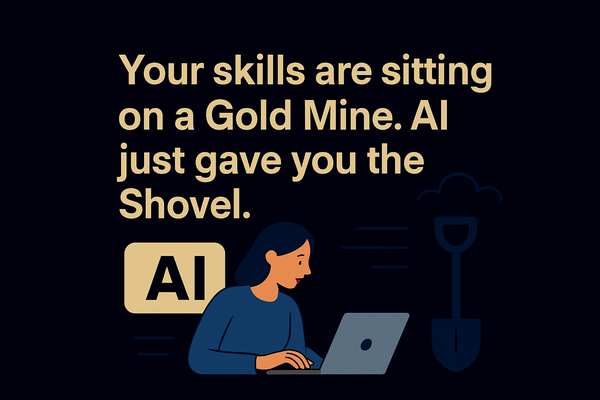Off-Page SEO Actually Matters More
Everyone obsesses over perfect website content. The uncomfortable reality? Google cares more about what others say about you than what you say about yourself. Here's how to build real authority.

In the endless scramble for online attention, most businesses fixate on what they can control: their website's content, its speed, the keywords they target. This is necessary, but it's only half the battle.
The uncomfortable truth is that what happens off your website often carries more weight in Google's eyes than what happens on it. These external signals form the foundation of digital authority.
It's like evaluating a company. The internal reports are one thing, but what does the market say? Who is backing them? What is their reputation? That is the essence of off-page optimization.
This isn't about finding loopholes. It's about building a trustworthy reputation across the web that search engines simply cannot ignore. Getting this right is what distinguishes businesses that merely exist online from those that have a strong, defensible presence in their market.
Insights
- Backlinks are a primary indicator of trust. Both the quality of the linking websites and the total number of unique sites linking to you are critical signals for search rankings.
- Authority is built on value. The most effective off-page strategies focus on creating genuinely useful assets—like original research or helpful tools—that earn links and mentions naturally.
- Reputation is more than just links. While not confirmed as direct ranking factors, signals like unlinked brand mentions and online reviews are believed to contribute to a holistic picture of your brand's authority.
- Violating the rules is a losing game. Using tactics like buying links can result in severe penalties from Google, including major ranking drops or complete removal from search results.
What Is Off-Page SEO? The Foundation of Digital Authority
Off-page Search Engine Optimization (SEO) includes all actions taken outside of your own website to affect your rankings within search engine results pages. It differs from on-page SEO, which deals with the content and code of your site itself.
The main goal is to demonstrate to search engines that your website is trustworthy, authoritative, and relevant. This directly supports Google's E-E-A-T framework: Experience, Expertise, Authoritativeness, and Trustworthiness. A strong off-page profile is an effective way to prove these qualities.
"Off-page SEO is about building a website’s reputation and authority, which is why earning high-quality backlinks is so critical."
Rand Fishkin Co-founder of SparkToro
Backlinks: The Votes of Confidence
A central aspect of off-page SEO is the backlink. When one website links to another, search engines view it as a vote of confidence. It signals that your page is credible and valuable.
The more high-quality votes you get, the higher your perceived authority and the better your chances of ranking for competitive terms.
"Backlinks are still the most important ranking factor for Google. If you want to rank, you need links from other authoritative sites."
Brian Dean Founder of Backlinko
But not all links are the same. They mainly come in two types: "dofollow" and "nofollow."
A dofollow link is the standard type that passes authority, or what some call ranking value, from the linking site to your site. These are the links that most directly influence your search rankings.
A nofollow link has a tag that tells search engines not to pass that ranking value. They aren't useless, though. They can still drive referral traffic, build brand awareness, and help create a natural-looking link profile.
The Characteristics of a Valuable Backlink
A single link from a top-tier source can be more impactful than a hundred from low-quality sites. Here is what gives a backlink its power.
1. Source Website's Authority
This is the most important factor. Links from established, highly respected websites like major news publications, universities (.edu), or government agencies (.gov) are exponentially more valuable than links from unknown personal blogs.
2. Source Page's Relevance
Context is crucial for link value. A link from an article about "advanced portfolio management" to your guide on "long-term dividend investing" is a highly relevant and powerful signal. That same link from a blog about classic cars would be confusing to search engines and carry far less weight.
3. Link Placement
Where a link appears on the page matters. A link placed naturally within the body of an article is seen as a genuine editorial endorsement. Links buried in a website's footer or sidebar are considered less important because they are not part of the core content.
4. Anchor Text
Anchor text is the visible, clickable text of a link. A natural and diverse anchor text profile is vital. Over-optimizing with the same keyword-rich anchor text is a major red flag for Google.
A healthy profile includes a mix of:
- Branded anchors: "Your Company Name"
- Naked URL anchors: "www.yourcompany.com"
- Generic anchors: "click here" or "read this guide"
- Topic-related anchors: "this study on market trends"
- Exact match anchors: "best retirement accounts" (These should be used sparingly.)
Ethical Strategies to Earn High-Value Backlinks
The best off-page SEO isn't about "building" links; it's about "earning" them. You achieve this by creating resources that others in your industry want to reference and link to.
Create "Linkable Assets"
This is the basis of modern link earning. Instead of just asking for links, create something that deserves them. Examples include:
- Original Research & Data: Conduct a survey or study in your industry and publish the findings. Journalists and bloggers love to cite new data.
- Comprehensive Guides: Create the single most in-depth resource on a specific topic in your niche.
- Free Tools & Calculators: Develop a simple, free tool that solves a common problem for your target audience, like a retirement savings calculator for a financial planning site.
- Clear Infographics: Turn complex data or processes into a clear, easy-to-share graphic.
Digital PR & Media Outreach
Digital PR involves creating newsworthy content—like the data studies mentioned above—and actively pitching it to journalists and influential bloggers. Securing coverage on a major news outlet can result in a highly authoritative backlink and significant brand visibility.
Guest Blogging on Reputable Sites
This involves writing and publishing an article on another website in your industry. This is not about spamming low-quality blogs. It's about contributing genuine expertise to an established site with a relevant audience, in exchange for a contextual link back to your own content.
Broken Link Reclamation
This is a strategy that benefits both parties. You find broken links on other websites using various tools. You then contact the site owner, alert them to the broken link, and suggest your relevant piece of content as a replacement. You're helping them fix their site while earning a link.
Unlinked Brand Mention Reclamation
Often, websites will mention your brand or company name without linking to you. Using tools like Google Alerts, you can find these "unlinked mentions." A simple, polite email to the author asking them to turn that mention into a hyperlink is often effective.
Off-Page Signals Beyond Backlinks
While links are a key element, a truly comprehensive off-page strategy incorporates other signals that build trust and authority.
Google Business Profile (GBP)
For any business with a physical location or service area, a fully optimized Google Business Profile is a critical local SEO factor. This includes not just accurate information, but also gathering positive reviews and responding to them. The quantity, quality, and recency of reviews are all important signals for local search performance.
Brand Mentions
Google is getting smarter. It can associate your brand with specific topics even without a direct hyperlink. Every time your brand is mentioned in a positive context on a relevant website, forum, or social platform, it can reinforce your topical authority.
"Google is getting better at recognizing brand mentions, even when they’re not linked, as a signal of authority and relevance."
Marie Haynes SEO Consultant and Founder of Marie Haynes Consulting
Online Reviews and Reputation
Positive reviews on trusted third-party sites like G2, Trustpilot, or industry-specific review platforms are powerful trust signals. They provide social proof that real customers value your business, which influences both potential customers and search engines.
Social Media Presence
While social media shares are not a direct ranking factor, an active social presence is important. It increases website visitors, boosts the visibility of your content, and can indirectly lead to backlinks when your content gets discovered and shared by bloggers or journalists.
An Important Warning: Avoid These "Black-Hat" Tactics
There are risks in off-page SEO, with shortcuts and schemes designed to manipulate search rankings. Engaging in these deceptive practices is a risky tactic that can result in severe penalties.
Buying Backlinks
Paying directly for a "dofollow" link is a clear violation of Google's guidelines. This is one of the fastest ways to earn a manual penalty that can cause your search rankings to drop significantly in a short period.
"Buying links or participating in link schemes is a violation of Google’s guidelines and can result in a manual action against your site."
John Mueller Search Advocate at Google
Private Blog Networks (PBNs)
A PBN is a network of websites created for the sole purpose of building links to a single target website. Google has become very effective at identifying and devaluing these networks, and being associated with one is harmful to your site's ranking.
Large-Scale Link Schemes
Avoid any activity that involves exchanging links at scale, using automated software to create links, or submitting your site to thousands of low-quality web directories.
Spammy Comments
Dropping irrelevant comments on blogs or forums with a link back to your site is not a valid strategy. It's spam. It provides no value, damages your brand's reputation, and is ignored by search engines.
The consequences for using these tactics are serious. A Google manual action can lead to a significant decrease in website visitors or, in the worst cases, your entire website being removed from Google's index. Short-term tactics that violate guidelines can result in long-term negative consequences.
Analysis
Let's cut through the noise. Off-page SEO isn't a checklist of technical tricks. It's the digital equivalent of building brand equity. Every high-quality backlink earned, every positive review, and every authoritative brand mention is a brick in the digital moat you're building around your business.
Think about it from a competitive standpoint. Your rivals can copy your website design. They can target the same keywords. They can even mimic your pricing. But they cannot easily replicate a decade's worth of earned trust and authority from hundreds of different reputable sources across the web.
That is the real asset. A strong off-page profile makes your business more resilient. It insulates you from the constant churn of algorithm updates because you're not relying on loopholes that can be closed overnight. Instead, you're aligned with what search engines have always wanted to reward: real-world authority and value.
The strategies that work—creating original research, earning media placements, becoming a trusted resource—are not just SEO tactics. They are sound business development activities that happen to have an immense positive impact on your search visibility. This is the shift in thinking that separates the players from the pretenders.
Final Thoughts
Stop chasing shortcuts. The game of manipulating search engines with low-quality tactics is over, and the house always wins. The real path to a higher ranking and a durable online presence is to focus on becoming the most authoritative and trustworthy resource in your field.
This means shifting your focus from "how can I get links?" to "how can I create something so valuable that people can't help but link to it?"
It's a long-term play. It requires patience and a genuine commitment to quality. But the result isn't just a better ranking. It's a stronger brand, a more defensible market position, and a business asset that pays dividends for years to come.
Did You Know?
Google's original PageRank algorithm, which revolutionized search, was inspired by academic citation analysis. Just as a frequently cited academic paper is considered authoritative, the algorithm treated a link from one website to another as a "citation," with links from more important sites carrying more weight.
This article is for informational purposes only and should not be considered professional or financial advice. The views expressed are those of the author and do not necessarily reflect the opinions of any organization. Always consult with a qualified professional before making any decisions based on the information provided.




